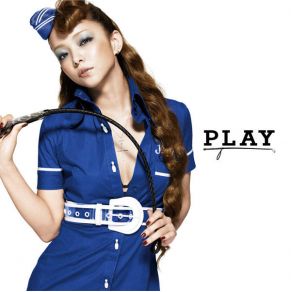PLAY
Download links and information about PLAY by Namie Amuro (安室奈美恵) / Namie Amuro (an shi nai mei hui). This album was released in 2007 and it belongs to Hip Hop/R&B, Soul, J-Pop genres. It contains 12 tracks with total duration of 50:45 minutes.

|
|
|---|---|
| Artist: | Namie Amuro (安室奈美恵) / Namie Amuro (an shi nai mei hui) |
| Release date: | 2007 |
| Genre: | Hip Hop/R&B, Soul, J-Pop |
| Tracks: | 12 |
| Duration: | 50:45 |
| Buy it NOW at: | |
| Buy on iTunes $12.99 | |
| Buy on Amazon $21.00 | |
| Buy on Amazon $73.33 | |
| Buy on Songswave €1.72 | |
Tracks
[Edit]| No. | Title | Length |
|---|---|---|
| 1. | HIDE & SEEK | 4:36 |
| 2. | FULL MOON | 3:57 |
| 3. | CAN'T SLEEP, CAN'T EAT, I'M SICK | 3:46 |
| 4. | IT'S ALL ABOUT YOU | 4:12 |
| 5. | FUNKY TOWN | 3:48 |
| 6. | STEP WITH IT | 3:47 |
| 7. | HELLO | 3:42 |
| 8. | SHOULD I LOVE HIM? | 4:25 |
| 9. | TOP SECRET | 4:30 |
| 10. | VIOLET SAUCE (SPICY) | 4:01 |
| 11. | BABY DON'T CRY | 5:21 |
| 12. | PINK KEY | 4:40 |
Details
[Edit]One of her highest-selling albums, Namie Amuro's Play was a windfall of basic R&B-flavored dance pop in 2007. The album opens with an intriguing cascade of marching band and synths in "Hide & Seek" that sounds incredible on its own. Amuro adds little in this first round. With the second track, she starts to pick up her presence, playing the kitten over a slinky beat track. Urban horn loops hold up "Can't Sleep, Can't Eat, I'm Sick" in a format that's not too far from a Jennifer Lopez track. "It's All About You" simply tries too hard at being something grandiose but falls victim to its own speed, faltering under the slur of Amuro's vocals. "Funky Town" finds a similar fate, but with a STOMP-like backing drowning out Amuro's aspirations instead. "Hello" seems to take a clever stylistic hook from En Vogue's rendition of "Free Your Mind and Your Ass Will Follow," and balladry makes an appearance with "Should I Love Him?" "Top Secret" and "Violet Sauce" do little to pick the aesthetics back up, unfortunately, but "Baby Don't Cry" finally gives a peek at Amuro's vocals with less electronic additions, and the album-ending "Pink Key" heads into fairly standard territory but does so with a nice focus on Amuro's vocals and a simpler, more stripped-down bit of pop that serves her skills well. The fundamental change between her previous albums and Play was Amuro's significant shift from being primarily a ballad singer to taking on more ambitious dance-pop. The dance tunes don't always hit as squarely as Amuro might hope, but it's a good effort and worth the time of her fans.